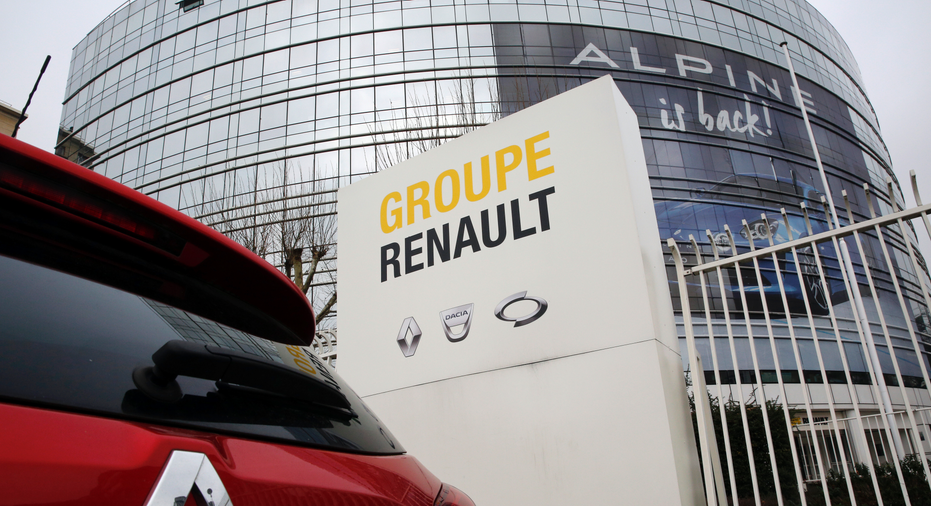Renault delays decision on Fiat Chrysler marriage proposal
This photo taken on Thursday, Jan. 24, 2019 show a Ranult car parking outside the French carmaker headquarters in Boulogne-Billancourt, outside Paris, France. French carmaker Renault looks set to give its approval to Fiat Chrysler's merger offer. The company's board is meeting Tuesday afternoon at its headquarters to decide on a deal that could reshape the global auto industry. (AP Photo/Christophe Ena)
PARIS – Renault has delayed a decision on whether to merge with Fiat Chrysler, a deal that could reshape the global auto industry as carmakers race to make electric and autonomous vehicles for the masses.
The deal still looks likely, but faced new criticism Tuesday from Renault's leading union and questions from its Japanese alliance partner Nissan . The French government is also putting conditions on the deal, including job guarantees and an operational headquarters based in France.
The French carmaker's board will meet again at the end of the day Wednesday to "continue to study with interest" last week's merger proposal from Fiat Chrysler Automobiles, Renault said in a statement.
A Renault board meeting Tuesday to study the deal was inconclusive. The company didn't explain why, but a French government official said board members don't want to rush into a deal and are seeking agreement on all parts of the potential merger.
The official, who spoke on condition of anonymity in line with government policy, told The Associated Press the conditions outlined by France's finance minister still "need to be met."
France and Italy are both painting themselves as winners in the deal, which could save both companies 5 billion euros ($5.6 billion) a year. But workers worry a merger could lead to job losses, and analysts warn it could bog down in the challenges of managing such a hulking company across multiple countries.
The big loser may end up being Japan's Nissan, whose once-mighty alliance with Renault and Mitsubishi is on the rocks since star CEO Carlos Ghosn's arrest in November.
Nissan CEO Hiroto Saikawa cast doubt Tuesday on whether his company will be involved in a Renault-Fiat Chrysler merger — and suggested adding Fiat Chrysler to the looser Renault-Nissan-Mitsubishi alliance instead.
Saikawa said in a statement that the Renault-Fiat Chrysler deal would "significantly alter" the structure of Nissan's longtime partnership with Renault, and Nissan would analyze its contractual relationships to protect the company's interests.
If Renault's board says "yes" to Fiat Chrysler, that would open the way for a non-binding memorandum of understanding to start exclusive merger negotiations. The ensuing process — including consultations with unions, the French government, antitrust authorities and other regulators — would take about a year.
A merger would create the world's third-biggest automaker, worth almost $40 billion and producing some 8.7 million vehicles a year. That's more than General Motors makes, and trails only Volkswagen and Toyota.
If the merged company were to include the Nissan-Mitsubishi alliance, too, it would be the No. 1 car producer in the world.
But Nissan wasn't consulted on the potential deal and before Ghosn's arrest, resisted his idea for a full merger with Renault. Ghosn denies accusations of financial wrongdoing.
Renault's board announced Tuesday that an internal audit of the alliance subsidiary RNBV found "deficiencies ... in terms of financial transparency and procedures for monitoring expenditure" and recommended a joint legal action with Nissan as a result.
The French government, which owns 15% of Renault, held talks with Renault and Fiat Chrysler in recent days, and a government official told The AP the "dynamic is positive" and the merger "makes sense."
Speaking only on condition of anonymity due to the government policy, the official said the merger should produce a Netherlands-based holding company. The government envisions Boulogne-Billancourt, Renault's home base outside Paris, as the location of the provisional operational headquarters.
Renault's CGT union slammed company management for not consulting union representatives in the talks and called the merger "fundamentally damaging to Renault, its engineering, its industrial strength and its workers."
A CGT statement Tuesday called the merger idea a "gift to the Agnelli family" that is Fiat's leading shareholder, arguing that Renault is the stronger company and that the deal would give away Renault's more advanced electric car technology without gaining anything comparable in exchange.
The union questioned Fiat Chrysler's argument about cost savings, saying the two companies' vehicles are too different to share technology, and warning that a merger would threaten the alliance with Nissan, which took many years to start saving the companies money.
The French government is insisting that any deal preserve French jobs and research and development sites, and a balance between both parties.
But the French official said it generally welcomes the deal as a win for both Renault and Fiat Chrysler, because each has strengths the other lacks.
Italian Deputy Premier Luigi Di Maio is closely following the potential merger. Di Maio said in a Facebook message Monday it would bring "a significant added value to Italy" and he "sees our country as one of the protagonists."
He said he took for granted that the deal would protect workers. Di Maio comes from the Naples suburb of Pomigliano, where Fiat has been building the Panda and which is slated to build a new Alfa Romeo SUV under longer-term plans to transform Italian plants to higher-margin premium vehicles.
___
Colleen Barry in Milan and Tom Krisher in Detroit contributed.





















